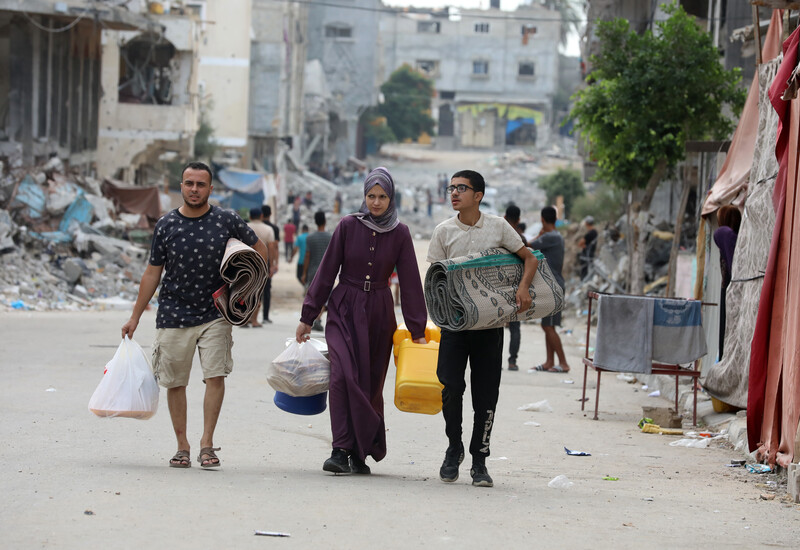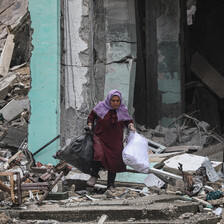The Electronic Intifada 20 September 2024

Displaced again. Three people carry their belongings as they leave an area in the Bureij refugee camp in the central Gaza Strip after an Israeli attack there killed nine on 17 September
APA imagesIn Gaza, forced displacement is a relentless reality.
It is also an historical trauma.
For those of us who grew up with the stories of the Nakba — our grandparents’ forced exile in 1948 — displacement was a wound passed down through generations that felt a distant tragedy of the past.
That distance shattered for me when Israel’s military aggression turned my life into a cycle of endless displacements, each more harrowing than the last.
In the heart of Gaza City’s south, our neighborhood of Sheikh Ijleen became a ghost town as families fled due to the Israeli military’s threats.
My family, the only one that refused to leave, held onto our home with a resolve that felt almost reckless. We didn’t know then that this decision would lead to a month of nights that felt like an eternity — nights of relentless bombing, where survival felt more like a cruel game of chance.
Each evening, as the sun hid below the horizon, the bombardment would begin, and I would brace myself, knowing that the next missile could be the one to end it all.
The last day of last October stands out in my memory as the worst night of all. The bombing was so intense that shrapnel rained down on our building, the walls shuddering under the impact, windows shattering into shards, and our garden transforming into a graveyard of metal debris.
The flash of a quadcopter drone, the constant thud of explosions, and the screams of terror from the families sheltering with us — these are memories that haunt me.
By dawn, it was clear we could no longer stay. The five families that had huddled together made a collective decision to leave. Within minutes, we packed whatever we could carry and fled to the al-Daraj neighborhood.
As we drove through the city, I saw Gaza not as the home I loved but as a city in ruins, a place I could no longer recognize. It was during that time that I first tasted the bitter feeling of displacement though I didn’t yet have the words to describe it.
January siege
January brought another displacement.
We had sought refuge near the United Nations headquarters in Gaza City, when rumors spread that the Israeli military was advancing and might invade the western part of the city. We prepared ourselves to run, but when relatives reached the door, they turned back in fear — an Israeli tank was right outside the door.
For two days, we were trapped, unable to leave, paralyzed by uncertainty. Questions plagued our minds:
Would we be displaced again?
Where would we go?
How would we escape?
Would the soldiers break into our building and force us to go south?
Would they kill us?
Or would they march us out with tanks at our backs, like cattle to slaughter?
The children’s cries, the whispered fears of the adults and the crushing sense of helplessness filled every corner of that building.
Then, unexpectedly, the soldiers did not charge the buildings. The men in our family, risking their lives, peeked through the windows — a dangerous act that could easily have been a death sentence.
But then again: what did they have left to lose after months of merciless genocide?
To their shock, they saw the tank pulling back, retreating out of sight.
“Let’s go! This is our chance!” they shouted.
We ran, our hearts pounding as we fled the building. The tank, however, came back, moving toward us. We didn’t stop. By some miracle, we made it to the eastern part of Gaza City, alive but displaced once again. This time, though, the terror we felt was like nothing before. The fragility of life, the ease with which it could be snuffed out, left an indelible mark on all of us.
An unfamiliar sky
April’s displacement brought a sorrow so profound that I can still feel it.
We headed to southern Gaza along al-Rashid Street. It was unrecognizable. The destruction was comprehensive, the street was torn up and the buildings I had grown up with turned to rubble.
I saw the sea — the sea that had always been a symbol of freedom, a place of solace for me — filled with soldiers and machines of war. Their presence tainted the beauty of the sea, a stark reminder that nothing in Gaza was truly ours anymore.
Walking through a checkpoint for the first time in my life, seeing soldiers up close, roaming freely in what was once our home, felt like a violation, a desecration of everything I held dear.
The memories I clung to, the images of a peaceful Gaza, were now stained with the reality of war and genocide. I no longer saw my city the way I once did; the innocence of those memories was lost forever.
I held onto the memory of my house through more than 10 displacements, dreaming of the day I could return. But that hope was crushed when I learned that the military had turned our area into a military camp, reducing my neighborhood to rubble.
The place that had once been my sanctuary is now a barren wasteland.
Displacement is not just about the loss of a home. It is the slow, agonizing loss of a piece of yourself. It’s the bitter truth that no matter where your feet may tread, you will never truly belong.
Here, in Egypt, I am a wanderer under a sky that is not my own, adrift in a land that offers no solace, only the cold reminder of what has been taken from me.
Gaza is not just a place; it is the very essence of who I am. Every grain of sand, every wave that kissed its shores, every memory now veiled in dust and rubble — they are all woven into the fabric of my soul. Displacement may have pushed my body to a foreign land, but it has not severed the bond that ties me to Gaza.
One day, I will return, flesh and blood, to the place where my heart was forged in the fires of love and loss. But even if that day never comes, let my longing be carried by the winds, back across the desert, to rest upon the sands of Gaza.
For even in ruins, Gaza is more my home than any other place on earth. In my Gaza’s embrace, I will find the peace that no other land can offer. Whether in life or memory, I will be home.
Roaa Shamallakh is a writer and translator from Gaza.





